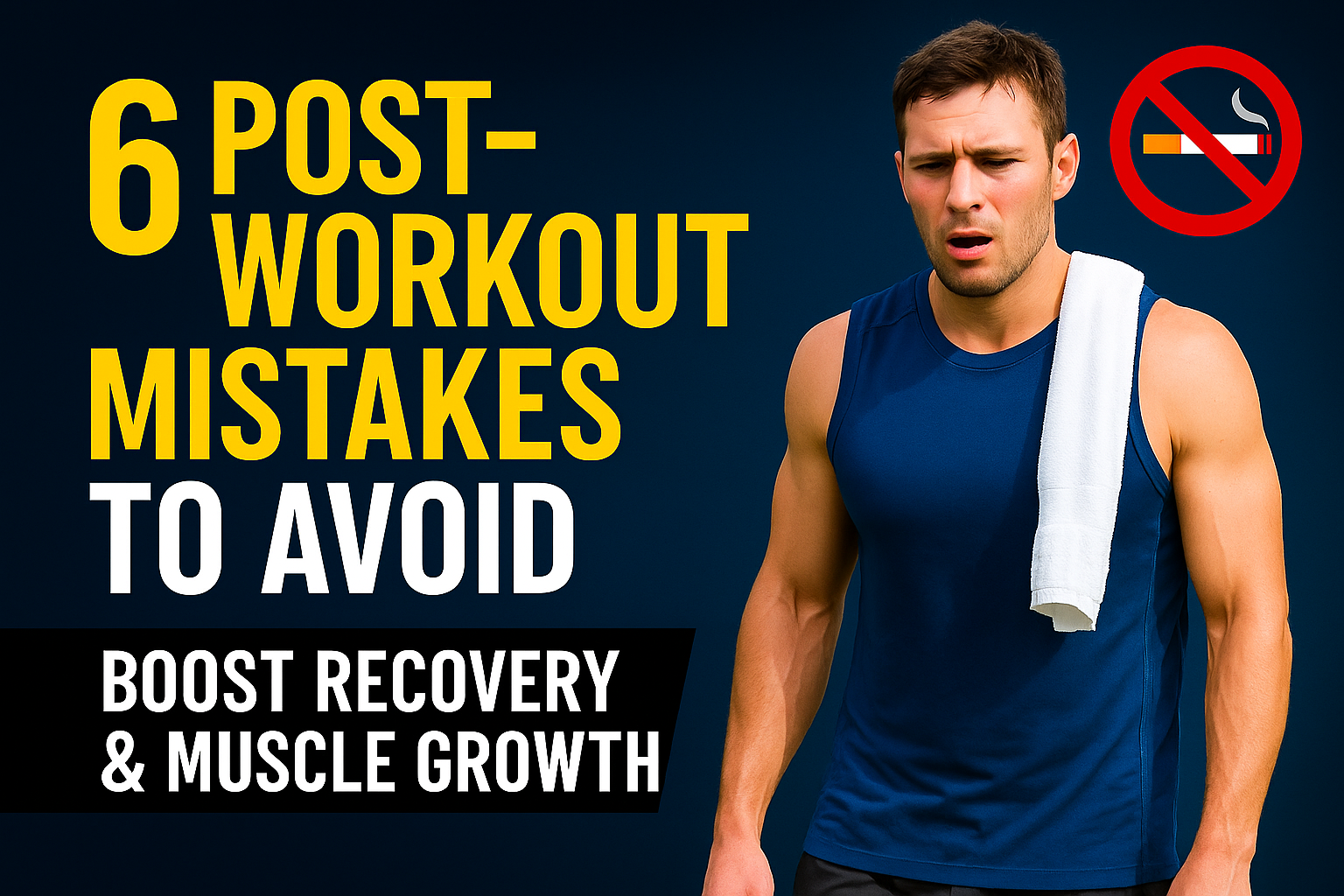Hello to all my readers! How are you all doing?
I’m back with another blog post, and today we’re diving into a crucial aspect of fitness: post-workout mistakes. These are six common things people often do after exercising that can negatively impact recovery and muscle growth. So, let’s get started and make sure you’re not falling into these traps!
1. Never Smoke After a Workout
- Once your workout ends, your body enters an active recovery phase. During this time, your heart rate and breathing remain elevated to meet the increased oxygen demands. However, lighting up a cigarette immediately after exercise can severely disrupt this recovery. Smoking leads to inflammation of the mucous membranes, restricting oxygen intake. Moreover, carbon monoxide present in cigarette smoke attaches to red blood cells, displacing oxygen and restricting its delivery to your muscle tissues. As a result, oxygen delivery is compromised, causing a buildup of lactic acid, muscle soreness, and overall fatigue.
- Additionally, smoking increases inflammation in your body, which can hurt your fitness performance. So, if you’re in the habit of lighting up after a workout, it’s time to quit for the sake of your health and fitness progress.
2. Don’t Skip Your Post-Workout Meal
- Skipping a meal after working out is one of the worst things you can do. Many people wait too long to eat, but after a workout, your body needs fuel to begin the recovery process. Post-exercise, your glycogen stores are depleted, and your blood sugar levels drop, which can lead to fatigue.
- To kickstart recovery, you should eat a meal rich in carbohydrates and protein within 30-40 minutes of finishing your workout. Carbohydrates help replenish glycogen, while protein repairs the muscle tissue that breaks down during exercise. Foods like potatoes, rice, bananas, chicken, fish, and eggs are all great options.
- For those who prefer supplements, **whey protein** is one of the best choices after exercise. Remember, if you skip your post-workout meal, your recovery will suffer, and your future performance will be affected.
3. Don’t Forget to Stretch
- Stretching is often overlooked, but it’s an essential part of the recovery process. Taking just 5-10 minutes to stretch after a workout can make a world of difference. “By stretching, you can prevent excessive lactic acid accumulation and improve oxygen delivery to muscle tissues.
- During strength training, your muscles contract and tighten. If you don’t stretch them out, you risk reducing your range of motion, weakening your muscles, and slowing recovery—all of which increase your risk of injury. Incorporating foam rolling, static stretching, or an active cool-down into your post-workout routine will not only help your recovery but also improve your flexibility over time.
4. Avoid Drinking Alcohol Post-Workout
- Many people wonder if it’s okay to have a drink after exercising, and the answer is simple: no. Alcohol consumption after a workout can negatively impact the body’s natural healing and recovery process. After exercise, your body needs to refuel and rehydrate, but alcohol does the opposite—it dehydrates you.
- Alcohol also suppresses protein synthesis, which is vital for muscle recovery. It lowers testosterone and growth hormone levels while increasing cortisol, the stress hormone, which hinders your natural recovery process. If you’re serious about your fitness, avoid alcohol post-workout. If you choose to consume alcohol, give your body a minimum of 4 hours to recover beforehand.
5. Don’t Eat Junk Food
- Following exercise, your body requires essential nutrients to rebuild and enhance muscle growth. But instead of nutritious food, many people turn to junk food like pizza, burgers, or sugary snacks. These foods are full of empty calories, providing little to no nutritional value, which can delay your recovery.
- It’s important to avoid fatty foods after exercise because fat slows down digestion, which delays the delivery of nutrients to your muscles. Instead, prepare a healthy protein and carbohydrate snack to eat right after your workout. In doing so, you’ll curb your hunger and aid your body’s healing process.
6. Don’t Forget to Track Your Progress
- Keeping a record of your progress helps you stay committed and on track toward achieving your fitness objectives. After every workout, make a note of your exercises, sets, weights, and reps. By keeping a record, you can challenge yourself to increase weights or repetitions the following week, leading to more consistent gains in strength and endurance.
- Tracking your progress also makes it easier to modify your workout schedule when needed.Additionally, it helps maintain your motivation and dedication toward achieving your fitness objectives. I also recommend taking weekly progress photos so you can see how far you’ve come and adjust your approach accordingly.
Conclusion
- These are six post-workout habits you should steer clear of to promote faster recovery and maximize muscle development. No matter if you’re aiming for muscle gain, fat loss, or overall fitness, following these suggestions can boost your progress significantly.
- As always, stay consistent, stay motivated, and avoid these common post-workout mistakes. I’ll continue bringing you valuable fitness insights, so stay tuned for more! Until then, take care and happy training!
If you don’t want to read, you can watch the video by clicking on this link.

